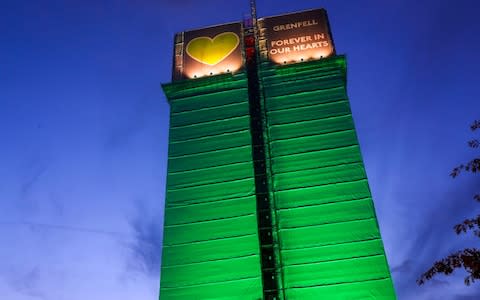Firms involved in botched Grenfell Tower revamp refuse to accept responsibility for tragedy, inquiry hears

Every private company involved in the botched refurbishment of Grenfell Tower has refused to admit any responsibility for the tragedy, an inquiry has heard.
The second phase of the public inquiry into the disaster began on Monday with an admonishment of the corporate witnesses from its top lawyer, who accused them of only blaming each other.
Major refurbishment works took place on the west London block between 2014 and 2016, which saw, among other things, a cladding system installed featuring combustible rainscreen panels.
The inquiry previously concluded many aspects of the improvement works failed to comply with building regulations and the cladding was found to have been a key factor in the spread of the inferno, which left 72 dead in 2017.
Opening the second stage of the inquiry at a new venue in Paddington, west London, Richard Millett QC said 19 corporate core participants involved in the refurbishment had provided statements.

He said: "With the sole exception of RBKC, not a single core participant involved in the primary refurbishment of Grenfell Tower has felt able to make any unqualified admission against its own interests.
"With that solitary exception, Mr Chairman, one finds in these detailed and carefully crafted statements no trace of any acceptance of responsibility for what happened at Grenfell Tower."
The Royal Borough of Kensington and Chelsea, which owned the 24-storey block, accepted that building control "should not have issued a completion certificate" for the refurbishment, as it did in July 2016, Mr Millett said.
The council admitted it did not meet its obligations as set out in building regulations. RBKC was said to have acknowledged its building control officials "failed to ask for comprehensive details" about key areas including the cladding system, the insulation and the architectural crown.
All three parts of the construction were found to have contributed to the spread of the fire.
Mr Millett said of the other corporate statements: "Any member of the public reading these statements and taking them all at face value would be forced to conclude that everyone involved in the refurbishment of Grenfell Tower did what they were supposed to do and nobody made any serious causative mistakes.
"All core participants who played a material part in Grenfell Tower have laid out a detailed case that it relied on others and how in no way was the work it did either substandard or non-compliant (with building regulations).
"In every case, what happened was, as each of them would have it, someone else's fault."
Given the findings in the first phase of the inquiry that the building was not compliant with building regulations, Mr Millett said, this is "unlikely".
He continued: “If lessons are to be learnt from what went wrong at Grenfell Tower and the necessary changes to the construction industry are to be made it is important that all those who gave evidence to module and indeed who are called throughout phase two provide a truthful...account of what happened during the primary refurbishment.
“Those who escaped from that burning building with their lives, or who lost loved ones and all that they possessed, are owed at the very least an honest and complete account from those witnesses who are in a position to explain why it happened."
Studio E, which was hired by contractor Rydon to act as the main architects for the project, said in its opening statement it was a “conscientious, ethical and responsible” company.
The company pointed the finger of blame at a “systemic issue” in the construction industry which allowed dangerous cladding products to be cleared for use on tall buildings.


